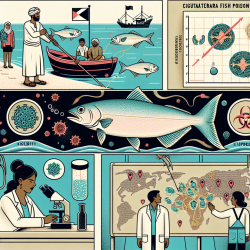Understanding Ciguatera Fish Poisoning: A Data-Driven Approach for Practitioners
Ciguatera Fish Poisoning (CFP) is the most frequently reported seafood-toxin illness worldwide, posing significant challenges to human health, social, and economic systems. As practitioners, understanding the clinical, epidemiological, and environmental aspects of CFP is crucial for improving patient outcomes and contributing to public health management. This blog delves into the insights from the research article "An Updated Review of Ciguatera Fish Poisoning: Clinical, Epidemiological, Environmental, and Public Health Management" to equip practitioners with the knowledge to enhance their practice.
Key Findings from the Research
The research article provides a comprehensive review of CFP, covering the human health effects of exposure to ciguatoxins (CTXs), diagnosis, pathophysiology, treatment, and prevention strategies. Here are some critical takeaways for practitioners:
- Diagnosis and Symptoms: CFP is characterized by gastrointestinal, neurological, and cardiovascular symptoms. Accurate diagnosis requires considering the patient's recent fish-eating history, clinical presentation, and, if possible, analytical testing of the consumed fish.
- Global Impact: The geographic reach of CFP has expanded due to international seafood trade and travel, emphasizing the need for global awareness and management strategies.
- Prevention and Management: Effective CFP management involves avoiding exposure to ciguatoxic fish, surveillance, education, and support from poison control centers.
Implementing Research Outcomes in Practice
Practitioners can leverage the research findings to improve their clinical practice and contribute to better public health outcomes. Here are some actionable steps:
- Stay Informed: Keep up-to-date with the latest research and guidelines on CFP to enhance diagnostic accuracy and treatment efficacy.
- Educate Patients: Inform patients about the risks of consuming certain fish species and the importance of seeking medical attention if symptoms arise.
- Collaborate with Public Health Authorities: Report suspected CFP cases to local health departments to aid in surveillance and outbreak management.
Encouraging Further Research
While significant progress has been made in understanding CFP, further research is needed to address gaps in knowledge and improve management strategies. Practitioners are encouraged to contribute to research efforts by:
- Participating in Studies: Engage in clinical trials and epidemiological studies to advance the understanding of CFP and its impacts.
- Sharing Clinical Insights: Document and share clinical experiences with CFP to inform future research and guideline development.
To read the original research paper, please follow this link: An Updated Review of Ciguatera Fish Poisoning: Clinical, Epidemiological, Environmental, and Public Health Management.










